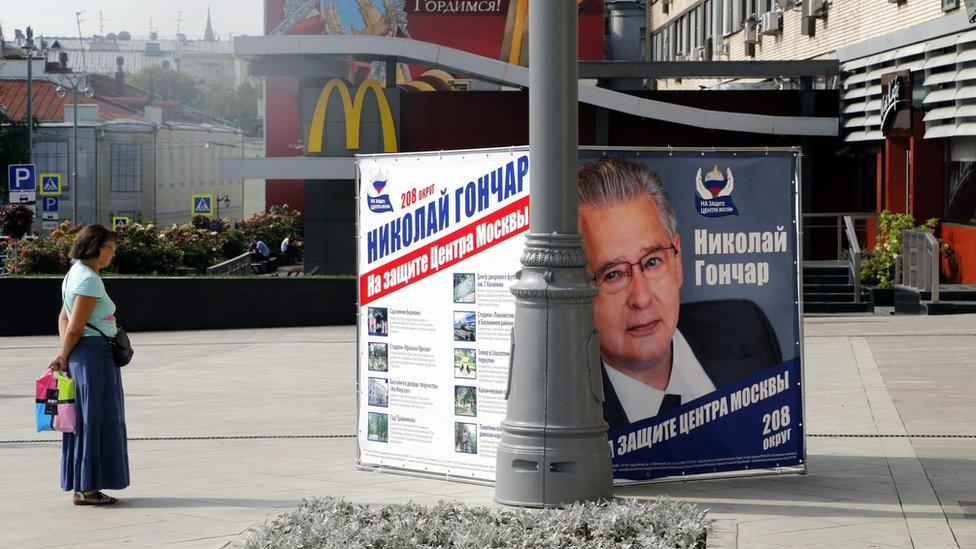Russia votes in parliamentary election with firm Putin grip
- Published
Sarah Rainsford reports from a Moscow polling station where there is a festive mood
Voting is ending in Russia's parliamentary elections dominated by President Vladimir Putin's supporters.
The last poll in 2011 was followed by mass protests as evidence of fraud emerged. This time serious violations were reported in one Siberian region.
For the first time, people are voting in Crimea, annexed from Ukraine in 2014 in a move condemned internationally.
There were reports of scuffles with Ukrainian nationalists as people voted at the Russian embassy in Kiev.
Voters will choose 450 MPs in the State Duma (lower house), for the next five years. The outgoing Duma had just a handful of MPs opposed to Mr Putin.
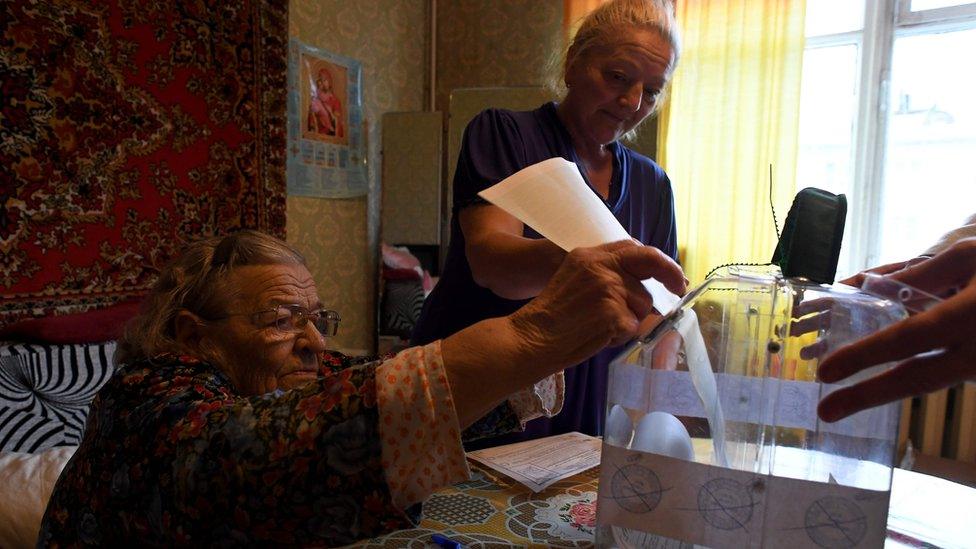
A woman votes at home in Moscow during the elections
Despite Russia's economic malaise and tensions with the West over the conflicts in Ukraine and Syria, some observers called the election campaign the dullest in recent memory. Widespread voter apathy suggests that turnout could be low.

Violations: By Oleg Boldyrev, BBC News, Moscow
As election day started across Russia's vast territory, the first turnout figures started coming in. In the Far Eastern region of Kamchatka only 34% of voters went to the polls.
It's too early to say whether this trend is going to hold across Russia. In Moscow early voting was mostly sluggish, although some polling stations were filled with dozens of voters at once, prompting suspicion of an organised vote.
The first reports of violations are also coming in from across the country, although so far not as numerous as in the 2011 campaign.
In one case, in Altai region, notorious "carousel" voting - people being bussed round polling stations and voting several times - was witnessed. Ella Pamfilova, the head of Russian Central Election Committee, threatened to cancel the results of the vote there and said a criminal case will follow.
Independent monitors say the influx of absentee votes is a major complaint, despite Mrs Pamfilova saying that the total number of absentees registered this time was half that of 2011.
She has brushed off reports of such irregularities, calling them "hysteria". Two days ago, summing up the pre-election campaign, Mrs Pamfilova acknowledged some violations were inevitable, but said she would do everything possible to fight fraud.

Among irregularities reported so far:
Monitoring group Golos says it had received more than 1,300 complaints by late afternoon, AP reports
Reports of "carousel" voting in the city of Barnaul, in the central Siberian Altai region, prompt officials to threaten to annul the election there
Two men detained in the Crimean port of Sevastopol on suspicion of organising carousel voting
Mr Putin voted at around lunchtime in southern Moscow
Questioned by journalists, the president said, quoted by Russian media: "I know who I'm voting for. Don't you have an idea?"
The first exit polls are expected on Sunday evening.
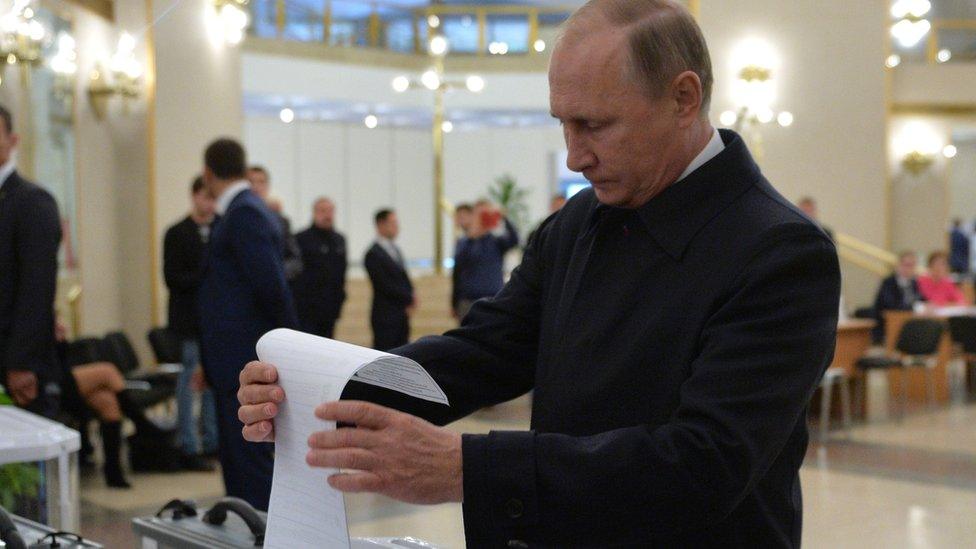
Mr Putin voted at the Academy of Sciences building in southern Moscow
Some critics of President Putin got a rare chance to put their case to a mass audience on TV but significant opposition figures like Alexei Navalny were barred from campaigning.
Ukrainian protests
Tensions are running high in Ukraine, with reports that right-wing Ukrainian activists were blocking the entrance to Russia's embassy in the capital Kiev.
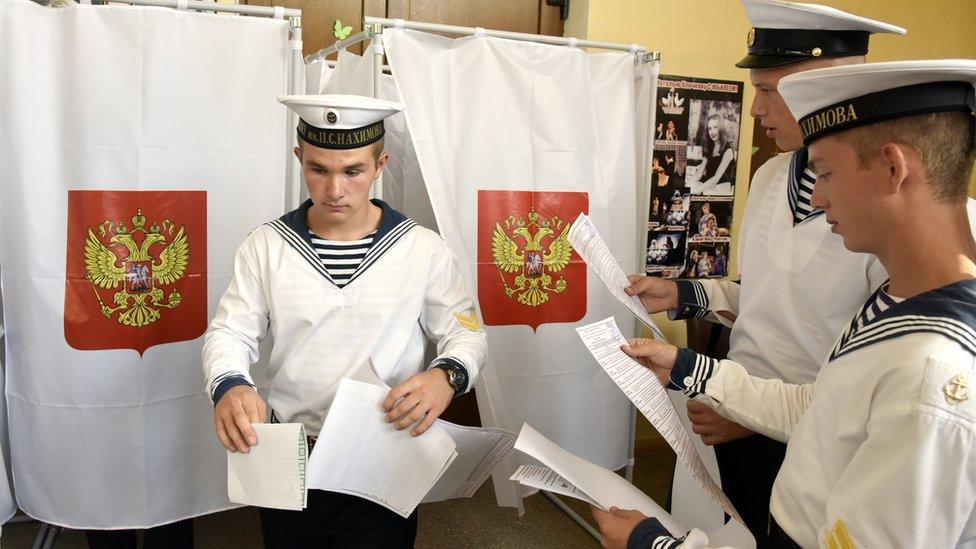
Voting in Crimea - annexed by Russia in 2014 - has angered Ukraine
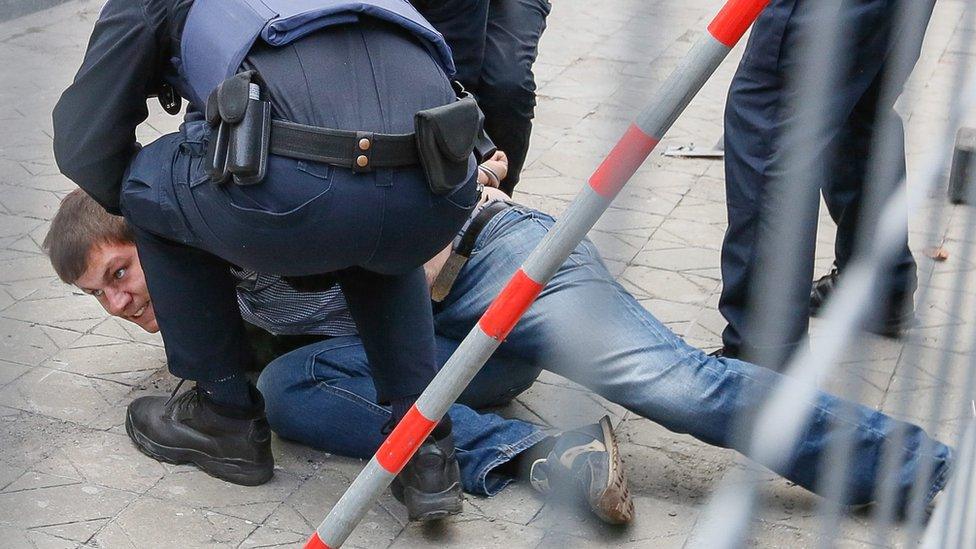
Nationalist activists have been trying to blockade the Russian embassy in Kiev
One demonstrator was arrested during scuffles with police, AP news agency reported.
Ukraine's government is furious about Russia's plans to hold elections in Crimea, annexed after an unrecognised referendum on self-determination.
A Ukrainian foreign ministry spokeswoman, Mariana Betsa, said voting in the Russian election could not take place in her country.
Ukraine refused to provide extra security at Russian consular buildings for the poll, but Russia insisted that polling stations would be set up in them anyway.
About 80,000 Russian voters live in Ukraine, Russian electoral officials say.
Ukraine's parliament, the Rada, has urged countries not to send observers to the Russian elections in Crimea and not to recognise the results there.
Any such visits will be treated as criminal violations of Ukraine's borders, the parliament warned.
President Putin's spokesman Dmitry Peskov countered that Russia did "not plan to discuss the electoral process on its territory with any other country".

Russian election battle
Four parties had MPs in the outgoing parliament and it was almost totally dominated by Putin supporters
Outspoken anti-Putin MPs were stripped of their mandates
This time half the Duma will be chosen by constituencies and half from party lists
14 parties are running, of which two are consistently critical of the Kremlin
Opposition is weak and divided - media coverage, especially on state TV, strongly favoured the ruling party United Russia
Previous election in 2011 was marred by allegations of fraud, which led to mass protests in Moscow.

- Published13 September 2016
